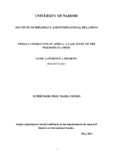| dc.description.abstract | Conflict in Africa has become a recurring decimal over time and ranges from wars of
liberation against colonial masters to struggles against oppressive governments. There have
also been conflicts arising from political exclusion, economic marginalization and social
oppression. It has been a common feature for women to be seen as the victims of conflicts
and requiring special legislation to protect them during conflicts.
In this research work, I have set out to establish that women take part in combat during
conflicts just like their male counterparts. They are active but are relegated to the background
at the end of hostilities and during demobilization exercise and this is the core of this work.
The female combatants have been noted to be physically strong and aptly buttress the
Amaizon feminism, which is the theoretical framework used for this research work. This
research was conducted through personal interviews, use of books, journals and online
sources.
It is my projection that if the ex – female combatants are given the same recognition they
enjoy during combats, they will not feel bitter and resort to crime. It is also important to state
that if they are given the necessary training to help them resettle after conflicts, less number
of them will be involved in crimes and they will play significant roles in post conflict
resolutions. This is because of their presence at the grassroots. The objectives of the study
cover the extent of involvement of female combatants in conflicts in Africa, reasons for the
participation of female combatants in the Niger Delta conflict, recruitment of the combatants
and the tasks assigned to them and their roles and status in peace in Africa
In various conflicts in Africa and with particular reference to the Niger Delta crisis in Nigeria,
it has come to the fore that female combatants play significant roles during conflicts. They are
foot soldiers, commanders and further serve as wives and mistresses of the male commanders
and some of the female combatants are used as sex slaves during combat. The recruitment of
the female combatants has been on the increase in recent years. The recruitment pattern is
usually thorough conscriptions and by voluntary enlistment. Reasons that account for
conscription include to beef up the ranks and to have female combatants that can play roles
noted above. Some of the female combatants voluntary enlist as a platform to redress male
domination within their communities; other reasons include poverty, unemployment but to
mention a few.
At the end of the research, the findings include the fact that, female combatants are recruited
by conscription and through voluntary means. It was also established that female combatants
were assigned tasks in all areas where their male counterparts operated. They are used as foot
soldiers, logistics commanders and sadly as sex slaves in rebel camps. It was established that
despite their prowess in battles, female combatants are not given due recognition during
demobilization exercises. They are easily told to go back home and resume their domestic
chores while their male counterparts are given training to help them resettle into normal life.
The effects of this neglect have been identified to include, rising numbers of ex- female
combatants who find it difficult to settle into normal life. They find it hard to get married and
handle domestic chores. Many ex – female combatants are involved in prostitution,
kidnapping and other sundry crimes. It was also established that ex- female combatants are a
ready army of recruits in a global world where terrorism is becoming wide spread.
The way forward to addressing the problems of the female combatants in Africa include the
implementation of UNSC Resolutions 1325 and 1385. There is also the need to criminalize
the stigmatization of ex-female combatants. The very key ideas of properly demobilizing
female combatants to enable them reintegrate with their families and to handle sensitive
issues in post conflict resolutions cannot be over emphasized. | en_US |

